Oculus Quest 2 vs. Oculus Quest: Should you upgrade?
We break down how the newer all-in-one headset improves on the original.
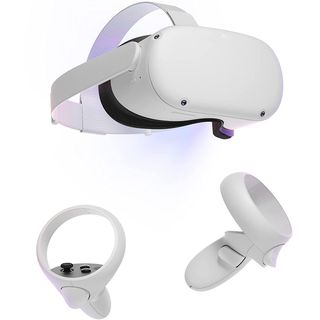
New and improved
The Oculus Quest 2 is lighter and more powerful than its predecessor. With the Snapdragon XR2 processor, a new 120Hz display, 128GB or 256GB of storage, and 6GB of RAM, the Oculus Quest 2 is the best way to experience the Oculus platform.
For
- Faster processor and more RAM
- 120Hz display and Wi-Fi 6 support
- Lighter than the original Oculus Quest
- Option for up to 256GB of storage
- Supports all Oculus Quest games
Against
- Only has one headphone jack
- Doesn't work with some old accessories
- Lacks "true blacks" due to LCD
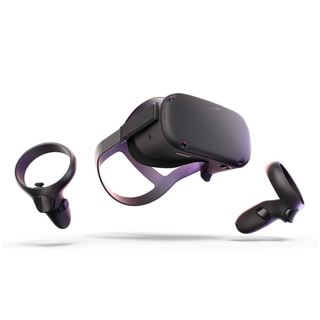
An aging headset
The original Oculus Quest was a great headset for its time, but it's been passed in just about every way by its successor, the Oculus Quest 2.
For
- Plays growing library of Oculus Quest games
- Supports older Oculus Go games
- Has two headphones jacks, allowing more options
- Shows "true blacks" with OLED display
Against
- Heavier than the Oculus Quest 2
- Has processor that's several years old
- Much lower resolution display
- Only has 4GB of RAM
- Max option of 128GB of storage
- Discontinued
The original Oculus Quest was a great headset for its time, but Facebook improved it across the board when designing the Oculus Quest 2. Now called the Meta Quest 2, the second version is lighter, more powerful, and more refined than its predecessor.
And it's not just the hardware improvements that make it a better choice. Like any new console, the Oculus Quest 2 has exclusive games like Resident Evil 4 VR that are too graphically intensive to run on the original Quest. Additionally, Oculus has made significant improvements to the software experience since the Quest 2 launched in fall 2020, including upgrading the display to 120Hz and doubling the refresh rate on the external cameras for a better hand tracking experience.
If you're buying a new VR headset, the Oculus Quest 2 is the clear choice, unless you want to wait for Project Cambria later in 2022. But if you're still an Oculus Quest 1 owner and want to know if you should upgrade to the newer headset, we have all the info you need to decide.
Oculus Quest 2 vs. Oculus Quest: Comparing the specs
Facebook improved the Oculus Quest 2 across the board compared to its predecessor. The Snapdragon XR2 processor is several generations newer than the Snapdragon 835 of the original Oculus Quest, and the 6GB of RAM of the Oculus Quest 2 helps the headset run more smoothly.
All of those internal improvements add up. In our Oculus Quest 2 vs. Oculus Quest graphics comparison, games were significantly better on the Oculus Quest 2 even at launch. These days, all new game releases feature enhanced graphics when played on an Oculus Quest 2 compared to the original Oculus Quest.
The Oculus Quest 2 delivers better performance at a higher refresh rate and frame rate, sharper images, and all-around better-looking games. As more developers take advantage of the Oculus Quest 2's hardware, games will continue to perform and look even better on the latest headset hardware.
| Category | Oculus Quest 2 | Oculus Quest |
|---|---|---|
| Processor | Snapdragon XR2 | Snapdragon 835 |
| RAM | 6GB | 4GB |
| Display refresh rate | 120Hz | 72Hz |
| Pixels per eye | 1,832x1,920 | 1,440x1,600 |
| Hand controls | Two Touch Controllers | Two Touch Controllers |
| Storage | 128GB 256GB | 64GB 128GB |
| 6 degrees of freedom | Yes | Yes |
| Oculus Guardian tracking | Yes | Yes |
| Oculus Link support | Yes | Yes |
| microSD slot | No | No |
| USB-C storage support | Yes | Yes |
| Wi-Fi support | Wi-Fi 5 and 6 | Wi-Fi 5 |
| Weight | 503g | 571g |
| Color | White | Black |
| Starting Price | $630 | $475 |
In addition to improving the major hardware internals, Facebook also refined the design when making the Oculus Quest 2. As a result, the Oculus Quest 2 is lighter, has more ergonomic Touch Controllers, and supports more accessories than ever before.
Be an expert in 5 minutes
Get the latest news from Android Central, your trusted companion in the world of Android
Oculus Quest 2 vs. Oculus Quest: Pricing for your budget
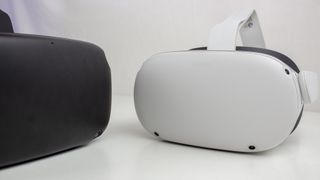
The Oculus Quest 2's price was one of the biggest surprises when it launched in 2020. Rather than lining up with the launch price of the Oculus Quest, the Oculus Quest 2 starts at $299. With a starting price that's $100 lower than the original Oculus Quest, it's a lot easier to jump into the next generation of VR.
Widening the gap even further, that $299 model now comes with 128GB of internal storage. That's the same amount of storage the original $500 Oculus Quest had. $399 will bring that total storage up to 256GB, leaving even more room for games and apps in the future. If you're debating on if the extra cost is worth it, we have a full breakdown comparing the 128GB and 256GB versions of the Oculus Quest 2 to help you out.
Oculus Quest 2 vs. Oculus Quest: Shining display
The display of the Oculus Quest 2 is also significantly improved. While it only supported 72Hz at launch, the Oculus Quest 2 received an update that increased that refresh rate to a whopping 120Hz. That's a 60% improvement in refresh rate in just one generation! The display of the Oculus Quest 2 also has significantly more pixels than that of the original Oculus Quest.
The Oculus Quest 2 display utilizes an RGB stripe layout, which means the sub-pixels are laid out in a straight line. That straight line forms together nicely with others when putting them all together in the square grid that makes up the display. Conversely, the original Oculus Quest uses a diamond PenTile pattern, which leaves gaps between pixels when arranged in a grid.
The result is a sharper-looking display when compared to PenTile OLED displays. Even if the Oculus Quest 2 and Oculus Quest had the same pixel count — which they don't — an RGB stripe display would still look sharper.
The only drawback of the Oculus Quest 2's display is that it is LCD rather than OLED. As a result, blacks aren't as dark on the Oculus Quest 2.
Oculus Quest 2 vs. Oculus Quest: What about Facebook accounts?
The Oculus Quest 2 is the first headset from Facebook to require people to use a Facebook account. That's considered a downside for some, but the original Oculus Quest will also require a Facebook account in the future to maintain full functionality by January 1, 2023. You'll have an option to merge their Oculus and Facebook accounts before that date.
Before you get too worried, Meta has since promised to remove the Facebook requirement, which means that some new form of account will likely be available on both the original and newer Quest models. This will likely take effect before Quest 1 owners have to rely on a Facebook account.
Oculus Quest 2 vs. Oculus Quest: A growing library of games
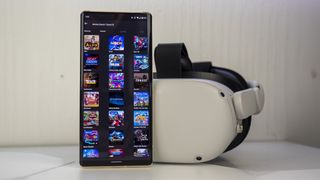
Both headsets share the same growing library of the best Oculus Quest 2 games, but there are a few Oculus Quest 2 exclusives that won't work on the original Quest, like Resident Evil 4 VR. Plus, even though most games work on both headsets, all games will look and likely perform better on the Oculus Quest 2.
Both headsets also support Oculus Link, allowing you to play PC VR games by connecting your VR headset to a gaming PC, either via a cable or wirelessly through your home's Wi-Fi network. In addition, since it supports the best Wi-Fi 6 routers, wireless PC VR gaming on the Quest 2 will look better and be more responsive than on the original Oculus Quest.
PC VR titles will look better on the Oculus Quest 2 because the Quest 2's screen is sharper and higher resolution.
Oculus Quest 2 vs. Oculus Quest: Should you upgrade?
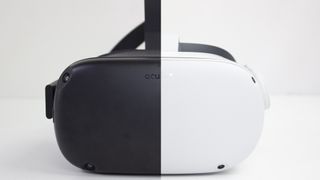
It's not surprising that the Oculus Quest 2 is better than the Oculus Quest in just about every way. If the Oculus Quest 2 wasn't better, that would be a reason for concern. It's akin to the PS4 being better than the PS5.
The jump from the original Oculus Quest to the Oculus Quest 2 isn't just about improving internal specs. Yes, the Oculus Quest 2 has a much faster processor, a better display, and more RAM, but it also has an improved design, better Touch Controllers, and support for more accessories.
Unlike laptops and phones, where buying an older model might save you some money and be worth it in terms of bang for your buck, the Oculus Quest 2 is better when it comes to price as well. The Oculus Quest 2 starts at $299, which is $100 cheaper than the original Oculus Quest. Even if you opt for the Oculus Quest 2 with 256GB of storage, it's still selling for $399, which is the starting price of the original 64GB Oculus Quest.
The Oculus Quest 2 is better across the board than the original Oculus Quest, and those improvements come with few drawbacks. The Oculus Quest 2 is more powerful, lighter, more refined, and cheaper than the original Oculus Quest. And Meta continues to add new features to it every month, features that the Oculus Quest doesn't have the specs to support.
So if you love your original Oculus Quest and want to get an even better VR experience, the Oculus Quest 2 is worth the upgrade.

Gaming like you've never experienced before
Facebook has improved seemingly everything with the second-generation Oculus Quest, making this the VR console to get.

A good headset that's been surpassed
The Oculus Quest was a great headset during its time, but it has since been passed by the Oculus Quest 2. Unless you find an absolute killer deal on the original Oculus Quest, you should grab its successor.

